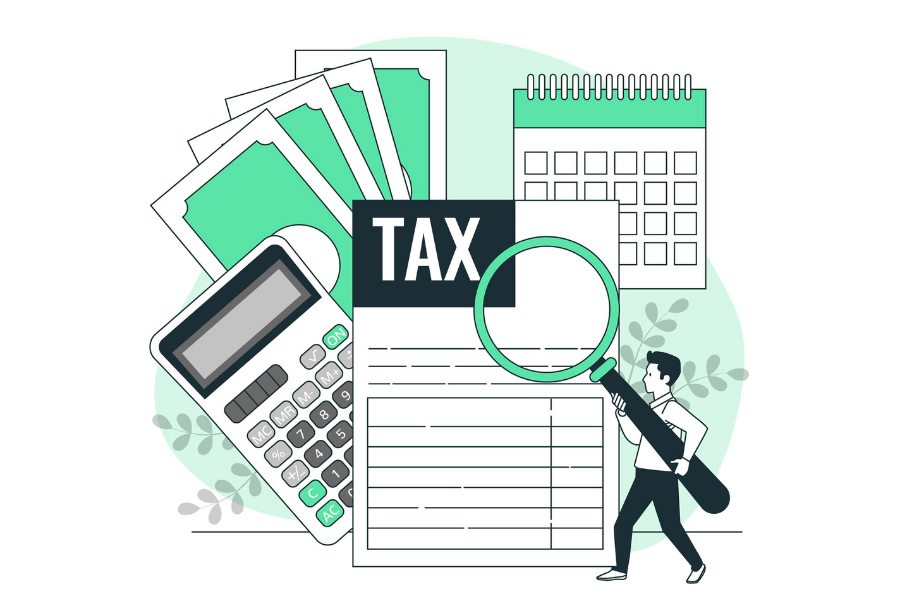Tax Planning
Maximize Your Savings and Minimize Liabilities with Expert Guidance
Mastering Tax Planning Strategies

Taxes come in various forms, including state taxes, central government taxes, direct taxes, indirect taxes, and more. For simplicity, we can categorize the types of taxation in India into two main groups: direct taxes and indirect taxes. This classification is based on the method through which taxes are remitted to the government.fonts, layouts, and more, making your site truly unique and a reflection of your brand.
Direct Tax
Indirect Tax
Unlocking Tax Planning Expertise for India's Financial Landscape
The Indian Income Tax Act offers various deductions that taxpayers can claim to reduce their taxable income when filing their Income Tax Returns. These deductions are available to all classes of taxpayers, including salaried individuals, professionals, and business owners. However, to benefit from these deductions, taxpayers need to engage in effective tax planning throughout the year.
When individuals engage in proper tax planning to minimize their tax liability, they can subtract eligible deductions from their gross total income. This results in a lower taxable income, on which income tax is then calculated based on the prevailing income tax slabs.
In essence, by taking advantage of these deductions through proactive tax planning, taxpayers can effectively reduce their tax burden and optimize their tax liabilities. It’s crucial for individuals to understand the available deductions and plan their finances accordingly to make the most of these tax-saving opportunities.
Maximize Tax Savings: Leveraging Sections 80C, 80CCC, and 80CCD(1)
To cultivate a savings-oriented culture and ensure efficient utilization of individuals’ savings, the government provides tax deductions under Sections 80C, 80CCC, and 80CCD(1) of the Income Tax Act. Taxpayers can collectively avail deductions of up to Rs. 150,000 under these sections. Effective tax planning enables individuals to maximize these deductions, whether through investments in a single section or a combination thereof, with the total deduction capped at Rs. 150,000.
Various government-designated investment instruments offer avenues for tax planning and subsequent savings. Popular options include Public Provident Fund (PPF) accounts, 5-year tax-saving fixed deposits, equity-oriented mutual funds, pension plans, Employee Provident Fund contributions, life insurance policies, and National Savings Certificate (NSC).
It’s crucial to differentiate these deductions from the Rs. 150,000 limit under Sections 80C, 80CCC, and 80CCD(1). Additionally, an extra deduction of Rs. 50,000 is available under Section 80CCD(1B) for investments in the National Pension Scheme (NPS), introduced through the Finance Act 2015 (Budget 2015), applicable from the financial year 2015-16 onwards.
Tax Benefits for Charitable Contributions: Section 80G Deductions
When a taxpayer contributes to charity, social causes, or philanthropic endeavors, or donates to the National Relief Fund, they can claim deductions under Section 80G of the Income Tax Act.
The Finance Ministry has designated specific organizations eligible for such donations, and the allowable deduction depends on the purpose of the donation. Depending on the organization and the cause, the deduction may be either 100% or 50% of the donation.
It’s important to note that donations made in kind are not eligible for deduction; only contributions made through cash or cheque qualify. For cash donations, only up to Rs. 2,000 can be claimed as a deduction. To claim deductions exceeding this limit, donations must be made via cheque.
This provision encourages taxpayers to contribute to charitable causes while providing them with tax benefits. By structuring donations accordingly, individuals can optimize their tax savings while supporting causes they believe in.
Optimizing Tax Savings with Sections 80D, 80DD, 80U & 80DDB
The Income Tax Act provides avenues for tax deductions when individuals spend on insuring their health or that of their family members. These deductions play a crucial role in tax planning, providing relief to taxpayers while promoting health and well-being. These are available under specific sections, each catering to different aspects of healthcare expenses:
Under Section 80D, taxpayers can claim deductions for medical insurance premiums paid for themselves, their spouses, or their dependent children. This provision incentivizes individuals to prioritize health insurance coverage for their immediate family, encouraging responsible financial planning for healthcare needs.
Under 80U a resident individual with a disability, can get tax deductions. The deduction amount is ₹75,000 for normal disabilities and ₹1,25,000 for severe disabilities (80% or more). To claim this deduction, the individual needs to provide a certificate from a medical authority confirming your disability. If the disability needs to be reassessed, the individual must get a new certificate from the medical authority as required.
Additionally, Section 80DDB offers deductions for expenses related to the treatment of specified diseases. This provision acknowledges the financial burden associated with medical treatments for certain ailments and aims to ease the tax burden for individuals facing such healthcare challenges.
Strategic Tax Management with Section 80CCG - RGESS
Individuals with an annual income of less than Rs. 12 Lakhs are entitled to an extra deduction under Section 80CCG for investing in shares of specified companies and mutual funds. This incentive is known as the Rajiv Gandhi Equity Saving Scheme (RGESS).
The RGESS is a somewhat intricate scheme designed primarily for first-time investors. It aims to encourage individuals to enter the stock market by offering tax benefits. However, it’s important to note that this deduction is exclusively available to first-time investors. Those who have previously invested in shares or mutual funds are ineligible to utilize this deduction for tax planning purposes.
This scheme reflects the government’s efforts to promote equity investments among new investors while simultaneously providing tax-saving opportunities. Understanding the eligibility criteria and intricacies of the RGESS can help individuals effectively plan their investments and optimize their tax liabilities.
Maximizing Tax Savings with Education Loans: Section 80E Benefits
When a taxpayer has obtained an education loan to finance their own, their spouse’s, their children’s, or a student for whom they are a legal guardian’s higher education expenses, they are eligible to claim a deduction under Section 80E, resulting in tax savings.
It’s important to note that this deduction is applicable solely for the repayment of interest and not for the repayment of the principal amount of the education loan. Unlike certain other deductions, there is no maximum limit imposed for claiming deductions under this section concerning the repayment of interest on education loans.
However, it’s worth mentioning that the benefits of Section 80E are restricted to individual taxpayers and do not extend to Hindu Undivided Families (HUF). This provision serves as an encouragement for individuals to pursue higher education by providing financial relief through tax deductions on the interest paid towards education loans.
Utilizing Home Loans for Optimal Tax Planning
If you’ve obtained a Home Loan, you’re eligible to seek deductions for repaying the principal amount under Section 80C. Additionally, you can also claim deductions for the interest paid on the home loan under Section 24.
In certain cases, the maximum deduction for interest paid can be up to Rs. 2,00,000, while in others, there’s no specified limit for claiming this deduction. Utilizing tax planning strategies by taking advantage of a Home Loan is strongly recommended. This is because deductions for home loan repayment can be claimed under three different sections of the Income Tax Act, leading to substantial tax savings for the taxpayer.
This approach not only helps in reducing the tax burden but also encourages individuals to invest in real estate through home ownership. Understanding the nuances of these deductions and structuring the home loan repayments accordingly can significantly optimize tax planning efforts and enhance overall financial management.
Strategizing Long-Term Capital Gains: Tax Management for Property Sales
When a taxpayer earns long-term capital gains from selling real estate property held for over two years, they can seek exemption from paying taxes on these gains by reinvesting the proceeds in specified instruments. This provision grants relief to individuals engaged in tax planning endeavors, offering a valuable opportunity to mitigate their income tax liabilities.
The essence of this exemption lies in the definition of long-term capital assets, which encompasses assets held for more than two years. By reinvesting the proceeds from the sale of such assets into specified instruments, taxpayers can defer or even entirely avoid paying taxes on the capital gains realized from the property sale.
This exemption not only facilitates the preservation and growth of capital but also aligns with the broader objectives of encouraging investments in specified sectors, contributing to economic growth and development.
Tax Deduction and its Benefits
Tax deduction is a valuable tool that allows individuals to lower the amount of their taxable income. Essentially, when you claim a tax deduction, you’re reducing the portion of your income that is subject to taxation. This means you get to keep more of your hard-earned money instead of paying it in taxes to the government.
By claiming tax deductions, you can lower the taxable portion of your income, effectively reducing the amount of tax you owe to the government. This means more money stays in your pocket rather than being allocated towards taxes.
Tax deductions typically prioritize reducing the portion of income subject to the highest tax brackets first. This means you can claim deductions for expenses such as tuition fees, medical costs, or charitable donations, which can significantly decrease your taxable income and overall tax liability.
Tax deductions typically prioritize reducing the portion of income subject to the highest tax brackets first. This means you can claim deductions for expenses such as tuition fees, medical costs, or charitable donations, which can significantly decrease your taxable income and overall tax liability.

Types of Tax Deductions

Public Provident Fund (PPF)
Contributions to PPF are eligible for tax deduction under Section 80C of the Income Tax Act. The interest earned and the maturity amount are tax-free.

National Saving Certificate (NSC)

Senior Citizen Savings Scheme (SCSS)

Unit Linked Insurance Plans (ULIP)

Bank Fixed Deposits (FDs)

Life Insurance Premiums

Mutual Funds & ELSS

Post Office Time Deposit (POTD)

Tuition Fees

Stamp Duty & Registration Charges

Home Loan EMIs

Medical Insurance Premiums

Infrastructure Bonds

Retirement Savings Plan

Charitable Donations

Preventive Health Check Ups

Deduction on House Rent Paid

Treatment of Disabled Dependents


